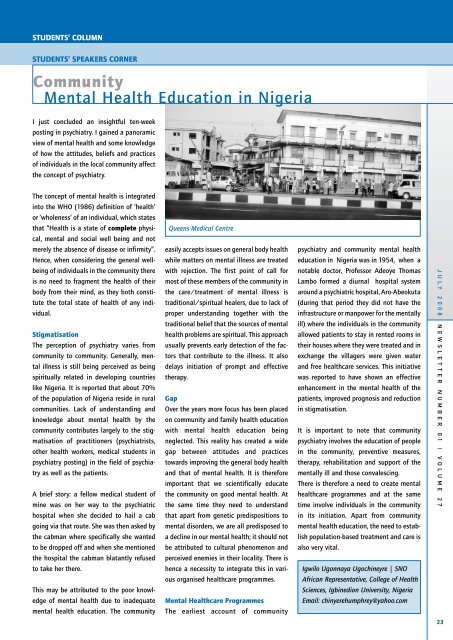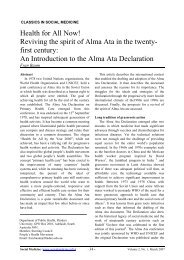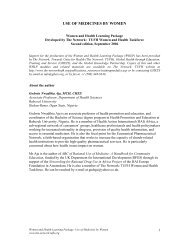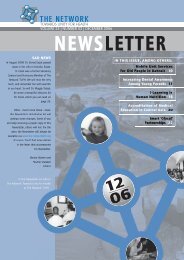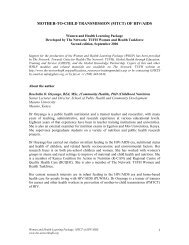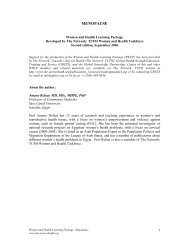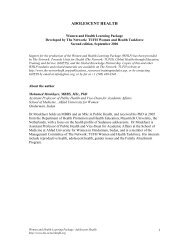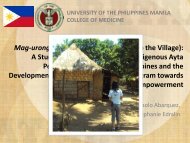Tamas Fülöp Award - The network - Towards Unity For Health
Tamas Fülöp Award - The network - Towards Unity For Health
Tamas Fülöp Award - The network - Towards Unity For Health
Create successful ePaper yourself
Turn your PDF publications into a flip-book with our unique Google optimized e-Paper software.
STUDENTS’ COLUMN<br />
STUDENTS’ SPEAKERS CORNER<br />
Community<br />
Mental <strong>Health</strong> Education in Nigeria<br />
I just concluded an insightful ten-week<br />
posting in psychiatry. I gained a panoramic<br />
view of mental health and some knowledge<br />
of how the attitudes, beliefs and practices<br />
of individuals in the local community affect<br />
the concept of psychiatry.<br />
<strong>The</strong> concept of mental health is integrated<br />
into the WHO (1986) definition of ‘health’<br />
or ‘wholeness’ of an individual, which states<br />
that “<strong>Health</strong> is a state of complete physi-<br />
Queens Medical Centre<br />
cal, mental and social well being and not<br />
merely the absence of disease or infirmity”.<br />
easily accepts issues on general body health<br />
psychiatry and community mental health<br />
Hence, when considering the general well-<br />
while matters on mental illness are treated<br />
education in Nigeria was in 1954, when a<br />
being of individuals in the community there<br />
is no need to fragment the health of their<br />
body from their mind, as they both constitute<br />
the total state of health of any individual.<br />
Stigmatisation<br />
<strong>The</strong> perception of psychiatry varies from<br />
community to community. Generally, mental<br />
illness is still being perceived as being<br />
spiritually related in developing countries<br />
like Nigeria. It is reported that about 70%<br />
of the population of Nigeria reside in rural<br />
communities. Lack of understanding and<br />
knowledge about mental health by the<br />
community contributes largely to the stigmatisation<br />
of practitioners (psychiatrists,<br />
other health workers, medical students in<br />
psychiatry posting) in the field of psychiatry<br />
as well as the patients.<br />
A brief story: a fellow medical student of<br />
mine was on her way to the psychiatric<br />
with rejection. <strong>The</strong> first point of call for<br />
most of these members of the community in<br />
the care/treatment of mental illness is<br />
traditional/spiritual healers, due to lack of<br />
proper understanding together with the<br />
traditional belief that the sources of mental<br />
health problems are spiritual. This approach<br />
usually prevents early detection of the factors<br />
that contribute to the illness. It also<br />
delays initiation of prompt and effective<br />
therapy.<br />
Gap<br />
Over the years more focus has been placed<br />
on community and family health education<br />
with mental health education being<br />
neglected. This reality has created a wide<br />
gap between attitudes and practices<br />
towards improving the general body health<br />
and that of mental health. It is therefore<br />
important that we scientifically educate<br />
the community on good mental health. At<br />
the same time they need to understand<br />
notable doctor, Professor Adeoye Thomas<br />
Lambo formed a diurnal hospital system<br />
around a psychiatric hospital, Aro-Abeokuta<br />
(during that period they did not have the<br />
infrastructure or manpower for the mentally<br />
ill) where the individuals in the community<br />
allowed patients to stay in rented rooms in<br />
their houses where they were treated and in<br />
exchange the villagers were given water<br />
and free healthcare services. This initiative<br />
was reported to have shown an effective<br />
enhancement in the mental health of the<br />
patients, improved prognosis and reduction<br />
in stigmatisation.<br />
It is important to note that community<br />
psychiatry involves the education of people<br />
in the community, preventive measures,<br />
therapy, rehabilitation and support of the<br />
mentally ill and those convalescing.<br />
<strong>The</strong>re is therefore a need to create mental<br />
healthcare programmes and at the same<br />
time involve individuals in the community<br />
J U L Y 2 0 0 8 N E W S L E T T E R N U M B E R 0 1 | V O L U M E 2 7<br />
hospital when she decided to hail a cab<br />
that apart from genetic predispositions to<br />
in its initiation. Apart from community<br />
going via that route. She was then asked by<br />
mental disorders, we are all predisposed to<br />
mental health education, the need to estab-<br />
the cabman where specifically she wanted<br />
a decline in our mental health; it should not<br />
lish population-based treatment and care is<br />
to be dropped off and when she mentioned<br />
be attributed to cultural phenomenon and<br />
also very vital.<br />
the hospital the cabman blatantly refused<br />
perceived enemies in their locality. <strong>The</strong>re is<br />
to take her there.<br />
hence a necessity to integrate this in vari-<br />
Igwilo Ugonnaya Ugochineyre | SNO<br />
ous organised healthcare programmes.<br />
African Representative, College of <strong>Health</strong><br />
This may be attributed to the poor knowl-<br />
Sciences, Igbinedion University, Nigeria<br />
edge of mental health due to inadequate<br />
Mental <strong>Health</strong>care Programmes<br />
Email: chinyerehumphrey@yahoo.com<br />
mental health education. <strong>The</strong> community<br />
<strong>The</strong> earliest account of community<br />
23


